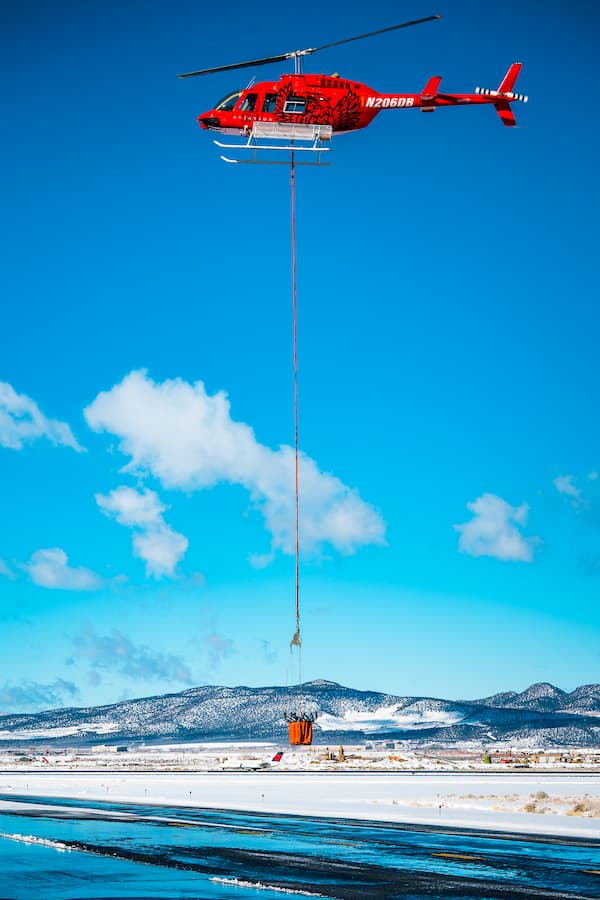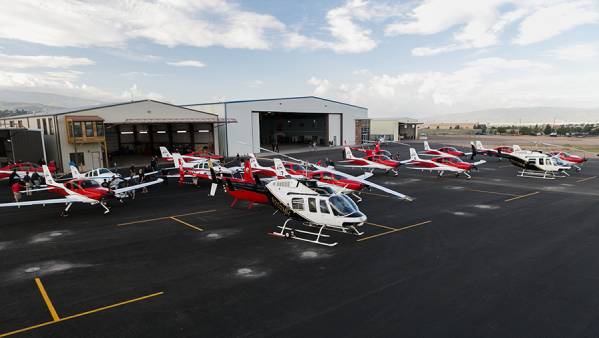Advantages of Training at a University Flight School
Posted: June 11, 2020 | Author: Jaidyn Crookston | Read Time: 6 minutes

When looking into civilian flight schools it’s important to be aware of your options. The two basic flight school options are training with a university flight school or training with a flight school that isn’t part of a university.
Both of these options will have the same basic end result–you’ll be certified to fly helicopters. However, the process of getting your license or certifications, and the level of training you go through will be very different at each one.
At a non-university flight school, you’ll get the minimum certifications required to work as a pilot. You’ll get your private, commercial, and maybe your instrument certifications. You won’t get other certifications and advanced training that will help you get a high paying job and stand out to employers.
There are many advantages to training at a university flight school. These advantages include:
- Typically more certifications
- Advanced training
- Associate’s, Bachelor’s, or Master’s degree
- Trained by the best
- High standards set by the university
- State-of-the-art equipment
- Industry partners
- Funding advantages
Here is some more information about each of these advantages.

More certifications
In addition to your private, commercial, and instrument certifications you’ll probably also earn CFI and CFII certifications at a university flight school. CFI and CFII stands for Certified Flight Instructor and Certified Flight Instructor Instrument. Having these certifications means that you’ll be able to get a job teaching other flight students. This is one of the most common first jobs for new pilots and it’s advantageous because you’ll earn more flight hours, get real world experience, and extend the time you have to pay off your loans if you work as a CFI while still in school. Having these certifications shows employers that you’ve gone through extensive training and know how to fly safely.
Advanced training
University flight schools also give advanced training such as turbine transition, night vision goggles, external load, and mountain operations. Having this advanced training will prepare you to fly anywhere in the world. Employers love to see this advanced training on a resume because they look for pilots with a lot of experience who will be able to handle any situation.
Associate’s, Bachelor’s, or Master’s degree
Having a university degree on top of your flight training will help you get higher paying jobs and will give you an advantage when looking at management positions. Flight companies like to hire pilots with a university degree, although a degree isn’t required to work as a pilot.

By the time you get your associate’s degree you’ll have your CFI license. If you choose to remain in school and get a higher degree then you may be able to work as a flight instructor at your own flight school. Flight schools love hiring back their own top students and being a flight instructor is one of the most common first jobs for a pilot. If you’re able to work as a flight instructor while pursuing your bachelor’s degree you’ll be able to earn money while still in school. You won’t have to pay back your student loans until you’ve graduated, giving you time to save money and become financially stable.
Some flight schools, such as SUU Aviation, allow you to go through flight training while getting your bachelor’s degree in another field such as marketing or business management. If you’re able to get your pilot’s license and get a degree in another field, you’ll be even more marketable to employers. This also gives you a back-up plan should you someday decide not to fly aircraft anymore. You’ll be able to search for a job related to your degree and will have more options than if you only had your pilot’s license.
Trained by the best
University flight schools are able to hire the most qualified instructors and management. This means that you’ll be trained by the best pilots the industry has to offer. Being trained by someone with experience both with flying in the field and with teaching at the university can be a great advantage.
High standards set by the university
Flight schools that are attached to an accredited university must meet the standards set by that university. Most universities hold students and professors to a very high standard, meaning that your training will be held to high standards as well. If you attend a flight school that is part of an accredited university, then you know that your training is meeting the highest standards possible.
State-of-the-art equipment
University flight schools typically have more money than non-university ones because they’re funded largely by the university itself. This means that a university flight school will be able to purchase and train students on state-of-the-art aircraft, simulators, and equipment. University flight schools often purchase the best airplanes and helicopters available for flight training and see safety as one of the biggest factors when purchasing new aircraft.
Industry partners
University flight schools are more easily able to make connections within the aviation industry. Many university flight schools have partnerships with companies in the industry. Students are often exposed to these connections through job fairs and industry partner events. These connections help the flight school grow, help their reputation, and help the students. Students at a flight school with industry partners may find it easier to get a job after graduation because many partnerships come with guaranteed interviews and other perks. Most university flight schools have higher job placement rates than non-university ones, largely because of these helpful industry connections.
Funding advantages

University flight schools often have more financial resources than non-university schools. For example, SUU Aviation employs a full-time aviation financial advisor to help students find funding through scholarships, grants, loans, and other financial aid.
Not only that, but university students simply have more funding opportunities than non-university students. As a flight student at a university, you’ll be eligible for federal financial aid, loans, and scholarships that aren’t accessible to flight students at a school that’s not attached to a university. This means that funding your flight training may be easier for you if you go to a university flight school.
A disadvantage:
While there are many advantages to training at a university flight school, there are also some disadvantages. The thing that many students see as the biggest disadvantage is the cost of a university flight program.
University flight schools are more expensive than non-university programs. This is because of the level of you’ll receive and the cost of tuition on top of your flight fees. However, cost should not be the thing holding you back from becoming a pilot.
Flight school is an investment. Yes, it will take some money from you now, but once you’re a pilot and are making money, you’ll quickly earn back the money you spent on your education. The average salary for a helicopter pilot is $95,000 per year and the average salary for an airplane pilot is $136,000 per year, according to salary.com. Once you’ve gotten a high paying pilot job you’ll be able to pay off your student loans and live a comfortable life.
If you have any questions about training at a university flight school, contact SUU Aviation. To see our state-of-the-art aircraft and equipment and meet our amazing staff, come in for a tour. We would love to help you start your path to becoming a pilot today!
This article was published more than 3 years ago and might contain outdated information or broken links. As a result, its accuracy cannot be guaranteed.
Tags: Aviation




